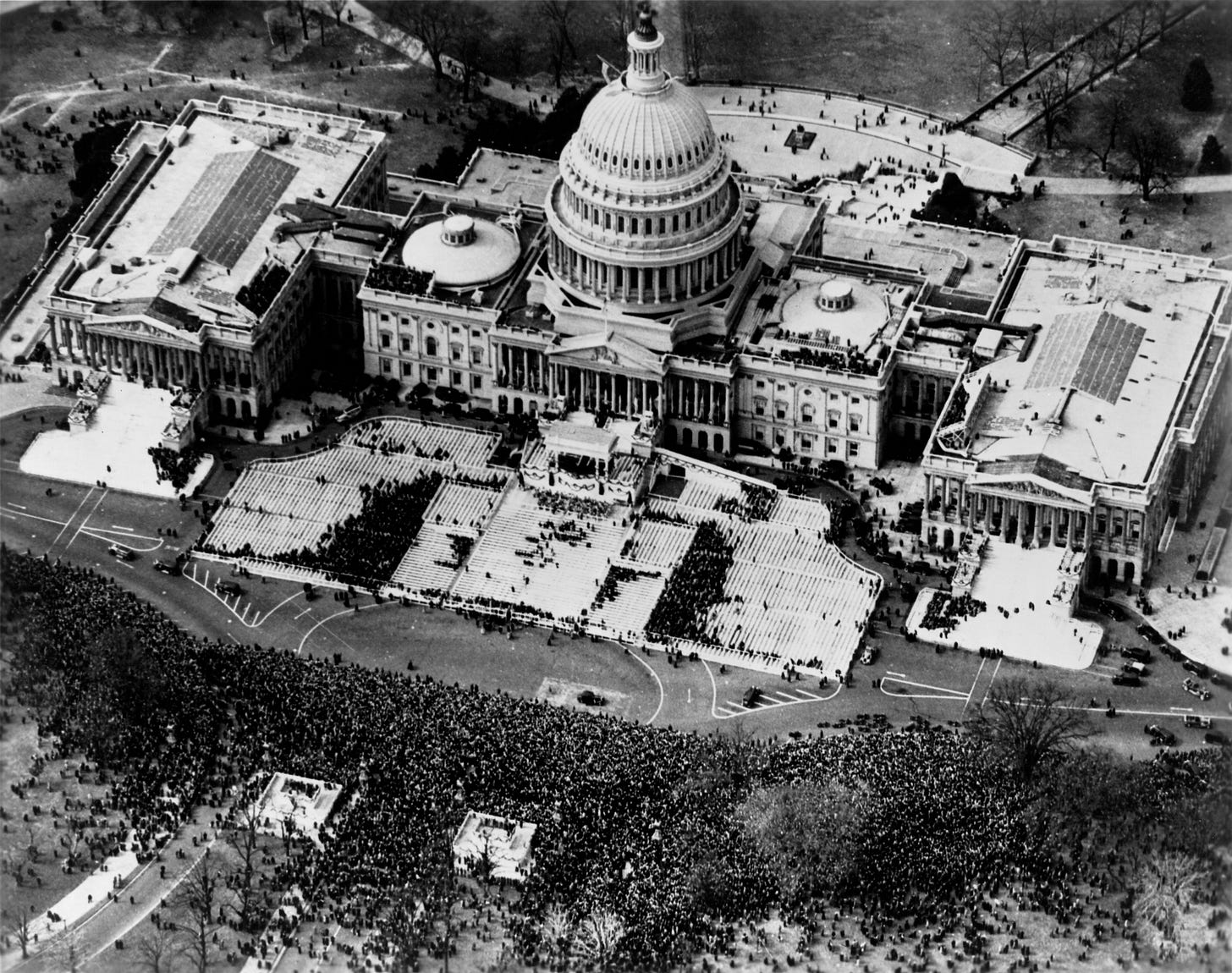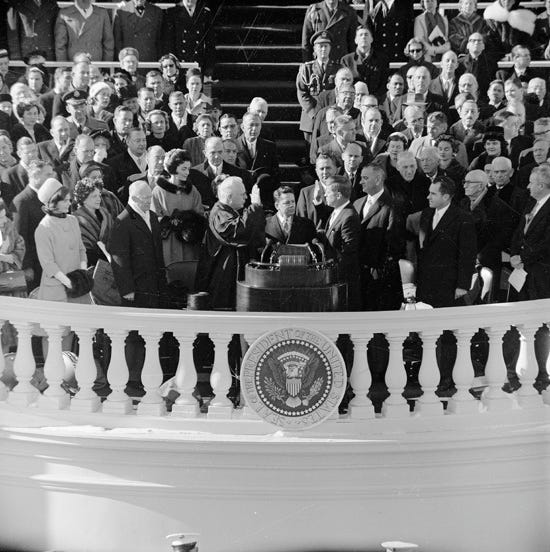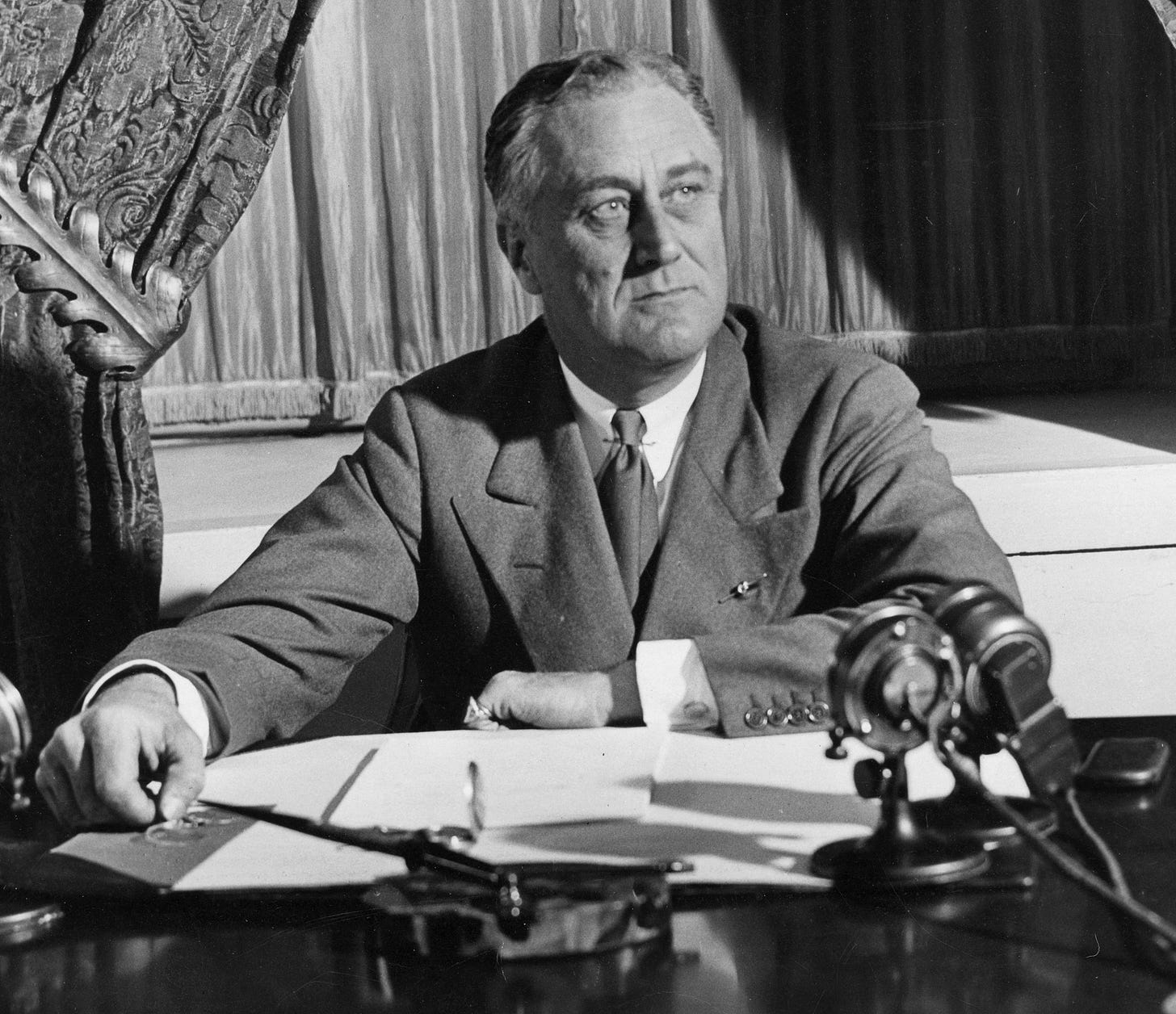Chapter 24: The Only Thing We Have to Fear
How Words Shape National Identity and Guide Us Through Crisis
Many people who do not know where this phrase came from could finish the sentence in the title. The complete quotation is:
“The only thing we have to fear is fear itself.”
The fact that this sentence is so memorable illustrates the potential importance of an inaugural address for defining a Presidency. Franklin D. Roosevelt (1882-1945) delivered the sentence in his first inaugural address on March 4, 1933. “So, first of all, let me assert my firm belief that the only thing we have to fear is fear itself – nameless, unreasoning, unjustified terror which paralyzes needed efforts to convert retreat into advance.”1
On January 8, 1932, a well-known journalist named Walter Lippmann (1889-1974) wrote: “Franklin D. Roosevelt is no crusader. He is no tribune of the people. He is no enemy of entrenched privilege. He is a pleasant man who, without any important qualifications for the office, would very much like to be President.”2
Lippmann never had the good grace to eat those words, but he should have. His first helping should have begun with Roosevelt’s first inaugural address. In the words of an historian: “The Roosevelt legend began dramatically the day he took office. . . . It was a time of acute national privation and foreboding. . . . Roosevelt instantly countered the pessimism with a bold, reassuring inaugural address that shifted the national spirit from gloom toward optimism. From an ambiguous figure, . . . Roosevelt emerged amazingly as a confident, commanding President.”3
This is a dramatic illustration of what an inaugural address can do. It can establish a President’s right to leadership. Yet think of how often this opportunity has not been seized. Ask yourself how many Presidential inaugural addresses have made an impression. Not many.


FDR’s first inaugural address was a high impact speech. And so also was his second inaugural address, delivered on January 20, 1937. After celebrating “our progress out of the depression,” he said, “I see millions of families trying to live on incomes so meager that the pall of family disaster hangs over them day by day. I see millions whose daily lives in city and on farm continue under conditions labelled indecent by a so-called polite society half a century ago. I see millions denied education, recreation, and the opportunity to better their lot and the lot of their children. I see millions lacking the means to buy the products of farm and factory and by their poverty denying work and productiveness to many other millions.” Then, in a famous line, “I see one third of a nation ill-housed, ill-clad, ill-nourished.”4
Blunt. Real. True.
But this address was actually optimistic. In his next sentence, Roosevelt said, “It is not in despair that I paint you that picture. I paint it for you in hope – because the nation, seeing and understanding the injustice if it, proposes to paint it out.”5 Roosevelt was saying something more than Bill Clinton said when he told the country that “I feel your pain.”6 Roosevelt intended to do something about the situation he described. Above all, FDR and his New Deal were about positive government. That is, the federal government should do what only the federal government could do in order to promote the general welfare.
The note of class conflict was present in both his first and the second inaugural addresses. In his first inaugural address, delivered in the midst of a crisis in the banking system, Roosevelt said, “[T]he rulers of the exchange of mankind's goods have failed, through their own stubbornness and their own incompetence, have admitted their failure, and abdicated. Practices of the unscrupulous money changers stand indicted in the court of public opinion, rejected by the hearts and minds of men. . . . They have no vision, and when there is no vision the people perish. The money changers have fled from their high seats in the temple of our civilization.”7
And in the second inaugural address, “We of the Republic pledged ourselves to drive from the temple of our ancient faith those who had profaned it; to end by action, tireless and unafraid, the stagnation and despair of that day. . . . We must find practical controls over blind economic forces and blindly selfish men. . . . We have begun to bring private autocratic powers into their proper subordination to the public's government. The legend that they were invincible--above and beyond the processes of a democracy--has been shattered. They have been challenged and beaten. . . . We have always known that heedless self-interest was bad morals; we know now that it is bad economics. Out of the collapse of a prosperity whose builders boasted [of] their practicality has come the conviction that in the long run economic morality pays.”8 It will be very surprising, indeed, if we hear anything like this on January 20.
Let us look at another inaugural address, parts of which have resonated long after its delivery. That is John F. Kennedy’s on January 20, 1961.

Kennedy (1917-1963) was a magnetic figure who knew how to deliver a speech. However, when one looks at the text closely, one finds oneself questioning whether that speech was as well considered as it should have been.
“Let the word go forth,” Kennedy declared, . . . “that the torch has been passed to a new generation of Americans--born in this century, tempered by war, disciplined by a hard and bitter peace. . . .”9 Present at the inauguration was Kennedy’s predecessor, Dwight D. Eisenhower (1890 – 1969), the hero of World War II and a man elected to the Presidency by landslides in 1952 and 1956. Were it not for the 22nd Amendment to the Constitution, ratified in 1951, which limits a President to two terms, Eisenhower probably would have been elected for a third term in 1960 had he chosen to run. Why insert that phrase "born in this century”? It is true that Kennedy was born in 1917 and Eisenhower in 1890. At 43 years of age, Kennedy was the youngest man elected to the nation’s highest office. (Theodore Roosevelt at 42 was the youngest man ever to become President, but he was not elected at that age. He acceded to the office from the vice presidency upon the assassination of William McKinley in 1901.) The phrase “born in the century” has rightly been called “a hit at Ike.”10 It was. And it was quite gratuitous.
“Let every nation know,” declared Kennedy, “whether it wishes us well or ill, that we shall pay any price, bear any burden, meet any hardship, support any friend, oppose any foe to assure the survival and the success of liberty. . . . Now the trumpet summons us again--not as a call to bear arms, though arms we need--not as a call to battle, though embattled we are-- but a call to bear the burden of a long twilight struggle, year in and year out, ‘rejoicing in hope, patient in tribulation’--a struggle against the common enemies of man: tyranny, poverty, disease and war itself.”11
One wonders what the old soldier Eisenhower thought of all this. Eisenhower was a man characterized by a “resolute lack of romanticism.” It was “no accident,” the historian Garry Wills has written, “that he changed Roosevelt’s name – Shangri-La – for the Presidential retreat in Maryland” to the name it bears today, Camp David, after Eisenhower’s son. Wills speculates that “Eisenhower must have heard the rhetoric of endless young officers, would-be [Douglas] MacArthurs who dashed into their own Bay of Pigs, when Kennedy orated that ’Now the trumpet summons us again.’” Perhaps Eisenhower “felt bemused and rather sorry for the new President who literally did not know what he was asking for.” Kennedy “seemed almost to long for adversity.”12
Kennedy was assassinated on November 22, 1963; so we will never know what a second inaugural address might have sounded like. One does wonder whether, tempered by the reality of the difficulty of navigating world affairs, it might have been a bit more down to earth.
Donald Trump’s first inaugural address was delivered on January 20, 2017. It was not a bad speech, and Trump delivered it well. Probably the most famous line from Kennedy’s inaugural address was, “Ask not what your country can do for you. Ask what you can do for your country.” Trump turned that around with the not un-reasonable assertion that “A nation exists to serve its citizens.” He also declared, “From this moment on, it's going to be America first. It is the right of all nations to put their own interests first.” And also, recalling Richard Nixon’s summoning “the great silent majority of my fellow Americans,”13 Trump declared, “the forgotten men and women will be forgotten no longer." And of course, he promised to “make America great again.” One remark he made in 2017 that we can be fairly sure he will not make in 2025 was, “Every four years, we gather on these steps to carry out the orderly and peaceful transfer of power. . . .14 Four years after he spoke those words, Trump unforgettably did everything possible to prevent that transfer from taking place.

What will Trump say now?
A small handful of men have had the opportunity to deliver a second inaugural address. On January 20, Donald Trump joins that exclusive group. The nation is divided and wandering in the wilderness hungering for leadership. Trump has a chance to redefine himself and in so doing to try to unify a fractured country.
This task has been attempted before, never more memorably than by the first Republican President, Abraham Lincoln. Lincoln was addressing a nation even more divided then the very un-United States is today. Lincoln’s speech was brief, only 701 words. It required just six or seven minutes to deliver. It was the greatest speech ever made by an American. Addressing a war ravaged nation which had every reason reason to bathe in hatred, Lincoln said: “With malice toward none, with charity for all, with firmness in the right as God gives us to see the right, let us strive on to finish the work we are in, to bind up the nation's wounds, to care for him who shall have borne the battle and for his widow and his orphan - to do all which may achieve and cherish a just and lasting peace among ourselves and with all nations."15
https://avalon.law.yale.edu/20th_century/froos1.asp
Frank Freidel, Franklin D. Roosevelt: A Rendezvous with Destiny (New York: Hachette, 1990) p. 87.
Friedel, Roosevelt, p. 115.
https://avalon.law.yale.edu/20th_century/froos2.asp
https://avalon.law.yale.edu/20th_century/froos2.asp
https://www.c-span.org/clip/campaign-1992/user-clip-clinton-i-feel-your-pain/5031955
https://avalon.law.yale.edu/20th_century/froos1.asp
https://avalon.law.yale.edu/20th_century/froos2.asp
https://www.jfklibrary.org/learn/about-jfk/historic-speeches/inaugural-address
Garry Wills, Nixon Agonistes (New York: Open Road, 2017) p. 168.
https://www.jfklibrary.org/learn/about-jfk/historic-speeches/inaugural-address
Wills, Nixon, p. 169.
https://voicesofdemocracy.umd.edu/nixon-silent-majority-speech-text/
https://trumpwhitehouse.archives.gov/briefings-statements/the-inaugural-address/
https://www.nps.gov/linc/learn/historyculture/lincoln-second-inaugural.htm



